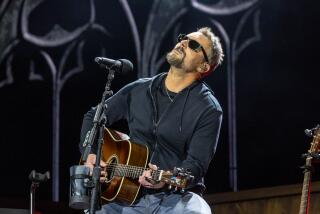POP MUSIC REVIEW : A Spinner of Tales Weaves His Magic in Rock Concert
- Share via
There is hardly anything more engaging than a good story. As a masterful spinner of tales--one of the best in rock at weaving dialogue, detail and wordplay into a song--Stan Ridgway has a tremendous advantage when he walks on stage, like a sleight-of-hand gambler with a sleeve full of face cards.
Helped at the Coach House in San Juan Capistrano on Friday night by a clear, well-balanced sound mix--a necessity for a performer so dependent on having his lyrics heard--and by a full house familiar with his yarns and delighted to hear them one more time, Ridgway and his band, Chapter 11, spun some memorable stories drawn from the naked city and the bare desert alike.
At his best, Ridgway erased the dividing line between teller and tale, and became an actor bringing mini-movie scripts to life with nuanced gestures and turns of voice. It happened on “Can’t Stop the Show,” a monologue in which Ridgway played a strip-joint proprietor who holds onto a code of ethics in seedy surroundings. He also was convincing as the bewildered cabbie of “Drive, She Said,” a stumblebum who by chance becomes a bit player in a scene of high intrigue involving a beautiful female bank robber.
“Camouflage,” a tall tale about a ghostly marine rescuing a comrade in the jungles of Vietnam, called for bigger gestures, and lost force because Ridgway didn’t supply them until the the end, when he led the band on a drill-cadence march.
All those songs were drawn from “The Big Heat,” the album Ridgway released two years ago after his departure from the band Wall of Voodoo. Scheduled to begin recording a follow-up LP later this month, Ridgway tried out four new songs at the Coach House. The warm reception they got had to be gratifying for the singer. But, on first listening, they followed a closer-to-the-surface approach that lacked the subtle narrative pleasures of the best songs on “The Big Heat.”
After an instrumental by the versatile Chapter 11--a five-member band capable of shifting deftly from jazz rhythms to reggae to driving rock, all within a single song--Ridgway climbed through the audience to the stage and opened with two of the new numbers. “For the Eyes of Dogs to Come” was steeped in Ridgway’s trademark irony, its light jazz swing recalling another musical ironist, Mose Allison.
“In Search of the Last Honest Man” is a catchy, straightforward pop-rocker with a theme as old as Diogenes himself. In it, Ridgway deliciously indicts a disc jockey who takes cocaine payoffs to play records: “He never seems to listen, and how he picks ‘em, no one knows.” The answer, it turns out, is that “he listens with his nose.” Finding only corruption, Ridgway (like Diogenes) nevertheless counseled that we keep looking for the good rather than fall into cynicism: “You gotta walk that mile, lookin’ for an honest man.”
“Can’t Complain” is a dialogue song based on an old joke that Ridgway still manages to play for decent laughs, while the other new number, “Roadblock,” is a basic, chunky rocker that sounded like Lou Reed’s “Vicious.” It hilariously portrays big doings in a dull desert town as the local lawmen get set to catch a killer headed their way.
“The Big Heat” offered small vignettes, with Ridgway providing enough detail and atmosphere to let listeners draw conclusions about the characters’ lives without being told what to think. The new songs, though, find him spinning out more of the plot line, and sometimes drawing the moral of the story to boot.
Maybe the more direct approach will help him clarify his point of view for more people. Without a close listening, it’s possible to dismiss this wiry, tart-voiced singer as an inveterate mocker. But, as anyone who heard him sing the quiet heartbreak of “Lost Weekend” and “Walkin’ Home Alone” at the Coach House could attest, Ridgway’s knack for exposing his characters’ foibles and failings doesn’t stop him from treating them with compassion at the same time.
Where Ridgway drew on the magic of storytelling, the opening duo, House of Freaks, drew on the power of history. For theme and substance, the two Virginians, transplanted a year ago to Los Angeles, turned to the dark side of the American past, where they found sources of present malaise. For style, they burrowed deep into the history of rock ‘n’ roll, coming up with dire country blues, folk balladry and John Lennon’s taut pop synthesis of the two.
Guitarist Bryan Harvey told the crowd that he and drummer Johnny Hott were playing on two hours sleep, having flown back from a show the previous night in Richmond, Va. Not recommended, but in this case, exhaustion actually may have helped to deepen the frayed intensity with which House of Freaks delivered its desperate songs.
The duo coordinated their basic attack well enough to avoid sparseness. Harvey’s twanging onslaughts alternated with Hott’s tribal pounding to fill in gaps, or the two instruments meshed to attain peaks. They also avoided monotony with a progression of styles that moved from blues to folk to songs.
More to Read
The biggest entertainment stories
Get our big stories about Hollywood, film, television, music, arts, culture and more right in your inbox as soon as they publish.
You may occasionally receive promotional content from the Los Angeles Times.










